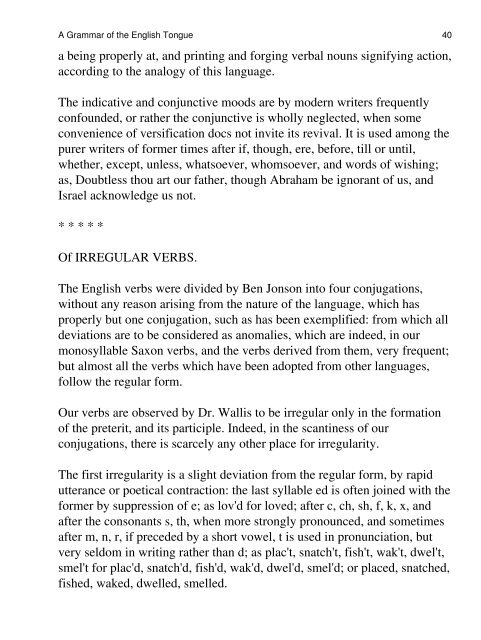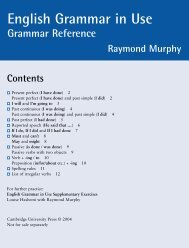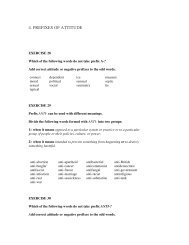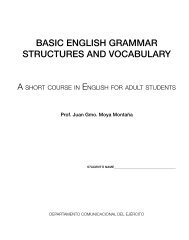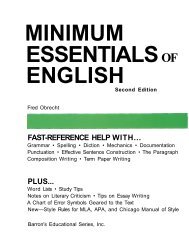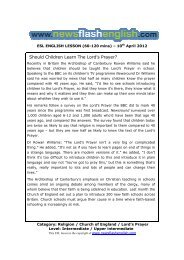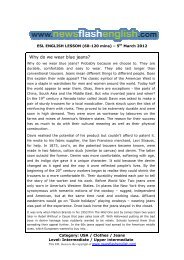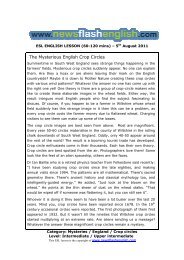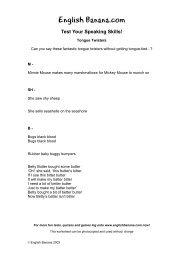A Grammar of the English Tongue - ESL Teachers Board
A Grammar of the English Tongue - ESL Teachers Board
A Grammar of the English Tongue - ESL Teachers Board
You also want an ePaper? Increase the reach of your titles
YUMPU automatically turns print PDFs into web optimized ePapers that Google loves.
A <strong>Grammar</strong> <strong>of</strong> <strong>the</strong> <strong>English</strong> <strong>Tongue</strong> 40a being properly at, and printing and forging verbal nouns signifying action,according to <strong>the</strong> analogy <strong>of</strong> this language.The indicative and conjunctive moods are by modern writers frequentlyconfounded, or ra<strong>the</strong>r <strong>the</strong> conjunctive is wholly neglected, when someconvenience <strong>of</strong> versification docs not invite its revival. It is used among <strong>the</strong>purer writers <strong>of</strong> former times after if, though, ere, before, till or until,whe<strong>the</strong>r, except, unless, whatsoever, whomsoever, and words <strong>of</strong> wishing;as, Doubtless thou art our fa<strong>the</strong>r, though Abraham be ignorant <strong>of</strong> us, andIsrael acknowledge us not.* * * * *Of IRREGULAR VERBS.The <strong>English</strong> verbs were divided by Ben Jonson into four conjugations,without any reason arising from <strong>the</strong> nature <strong>of</strong> <strong>the</strong> language, which hasproperly but one conjugation, such as has been exemplified: from which alldeviations are to be considered as anomalies, which are indeed, in ourmonosyllable Saxon verbs, and <strong>the</strong> verbs derived from <strong>the</strong>m, very frequent;but almost all <strong>the</strong> verbs which have been adopted from o<strong>the</strong>r languages,follow <strong>the</strong> regular form.Our verbs are observed by Dr. Wallis to be irregular only in <strong>the</strong> formation<strong>of</strong> <strong>the</strong> preterit, and its participle. Indeed, in <strong>the</strong> scantiness <strong>of</strong> ourconjugations, <strong>the</strong>re is scarcely any o<strong>the</strong>r place for irregularity.The first irregularity is a slight deviation from <strong>the</strong> regular form, by rapidutterance or poetical contraction: <strong>the</strong> last syllable ed is <strong>of</strong>ten joined with <strong>the</strong>former by suppression <strong>of</strong> e; as lov'd for loved; after c, ch, sh, f, k, x, andafter <strong>the</strong> consonants s, th, when more strongly pronounced, and sometimesafter m, n, r, if preceded by a short vowel, t is used in pronunciation, butvery seldom in writing ra<strong>the</strong>r than d; as plac't, snatch't, fish't, wak't, dwel't,smel't for plac'd, snatch'd, fish'd, wak'd, dwel'd, smel'd; or placed, snatched,fished, waked, dwelled, smelled.


